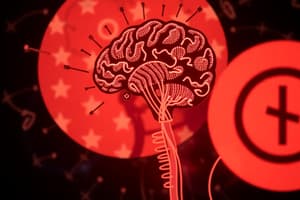Podcast
Questions and Answers
What does economics primarily investigate?
What does economics primarily investigate?
- Production of goods and services (correct)
- Historical events
- Cultural interactions
- Evolution of societies
Which concept forms the foundation of economic analysis?
Which concept forms the foundation of economic analysis?
- Social structures
- Rational self-interest
- Utility maximization (correct)
- Scarcity
What is a key principle central to economics?
What is a key principle central to economics?
- Scarcity and trade-offs (correct)
- Minimization of social interactions
- Maximization of leisure time
- Equal distribution of resources
In economics, what do individuals strive to maximize according to the text?
In economics, what do individuals strive to maximize according to the text?
What does the 'law of demand' primarily relate to in economics?
What does the 'law of demand' primarily relate to in economics?
How does economics view human behavior according to the text?
How does economics view human behavior according to the text?
What is the primary focus of social economics?
What is the primary focus of social economics?
Which of the following is NOT considered a factor contributing to income inequality?
Which of the following is NOT considered a factor contributing to income inequality?
What role do economists play in understanding government policies?
What role do economists play in understanding government policies?
Which area of economic research focuses on cognitive biases and emotions in decision-making?
Which area of economic research focuses on cognitive biases and emotions in decision-making?
Who are some notable scholars mentioned in the text who have made significant contributions to economic theory?
Who are some notable scholars mentioned in the text who have made significant contributions to economic theory?
What tools do economists use to determine the impact of specific policies?
What tools do economists use to determine the impact of specific policies?
Study Notes
Exploring Social Science through Economics
Social science is a vast and diverse field, encompassing the study of human behavior, interactions, and the systems that govern our societies. One of the most prominent branches within social science is economics – a discipline that investigates the production, distribution, exchange, and consumption of goods and services. By delving into the world of economics, we can gain valuable insights into human behavior, societal structures, and the complex dynamics that shape our world.
Economics: Building a Framework for Analysis
Economics provides a unique perspective on human behavior and interactions through the lens of rational self-interest. The basic economic assumption is that individuals strive to maximize their well-being, seeking the most efficient way to meet their needs and wants. This concept, known as "utility maximization," forms the foundation of economic analysis.
Central to economics is the concept of scarcity and the trade-offs that individuals must make in response to it. For example, when an individual has limited resources, they must choose between spending money on food, housing, or education. This fundamental idea of scarcity and choice forms the basis of the "law of demand" and other core economic principles.
The Intersection of Economics and Social Science
Economics is not solely focused on individual behavior; it also considers the broader social context in which economic activity occurs. The study of this interplay between individual and societal factors is known as "social economics."
One prominent area of social economics is the study of income inequality – how income is distributed within a society and the consequences of this distribution. Economists investigate factors that contribute to income inequality, such as education, occupation, and gender, and consider how these factors affect individual well-being and societal outcomes.
Economics also plays a significant role in understanding the effects of government policies, such as taxation and regulation, on individual and societal well-being. Economists use tools like cost-benefit analysis to determine the impact of specific policies and provide evidence-based guidance for policymakers.
The Role of Economics in Social Science Research
Economics provides economists and other social scientists with powerful analytical tools that can help to shed light on complex social phenomena. For example, economists use statistical methods to test hypotheses about human behavior and the impact of economic policies. These methods, such as regression analysis and game theory, can help social scientists to understand and predict the behavior of individuals and societies.
Economics also provides a framework for considering the trade-offs that individuals and societies must make in pursuit of their goals. For example, economists can help policymakers to understand the trade-offs between environmental protection and economic growth, or between fairness and efficiency in the distribution of income.
Advances in Economic Theory and Research
Economic theory has evolved significantly over time, with notable contributions from scholars like Adam Smith, John Maynard Keynes, and Milton Friedman. Today, economists continue to expand upon these foundational ideas, while also integrating insights from related fields, such as psychology, sociology, and political science.
One emerging area of economic research is "behavioral economics," which considers the influence of cognitive biases and emotions on individual and collective decision-making. By integrating insights from psychology, behavioral economists can help to develop more accurate and realistic models of human behavior, enabling us to better understand and address societal challenges.
Conclusion
Economics provides a valuable lens through which to examine social phenomena, offering a framework for understanding and predicting human behavior, the distribution of resources, and the impact of government policies. By exploring the interplay between economics and other social science disciplines, we can gain a richer understanding of complex social phenomena, such as income inequality, environmental protection, and public policy. In doing so, we can develop evidence-based solutions to the challenges that confront us as a global society.
Studying That Suits You
Use AI to generate personalized quizzes and flashcards to suit your learning preferences.
Description
Delve into the world of economics to gain valuable insights into human behavior, societal structures, and the complex dynamics that shape our world. Discover how economics provides a unique perspective on rational self-interest, scarcity, income inequality, and the effects of government policies within the broader social context.




